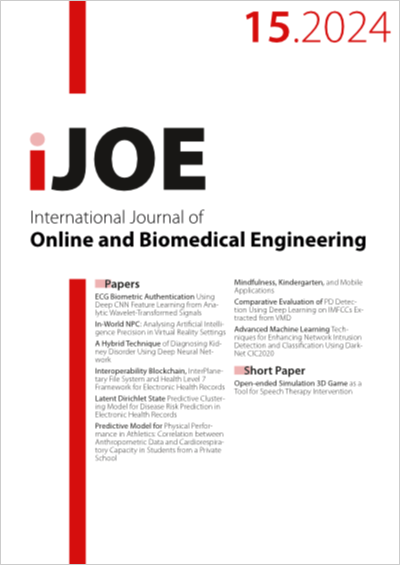ECG Biometric Authentication Using Deep CNN Feature Learning from Analytic Wavelet-Transformed Signals
DOI:
https://doi.org/10.3991/ijoe.v20i15.51041Keywords:
ECG, Biometric, Authentication, Convolution Neural Network(CNN), Continuous Morse Wavelet TransformAbstract
This paper investigates the use of continuous morse wavelet transform (CWT) coefficients as inputs to convolutional neural networks (CNNs) for electrocardiogram (ECG) biometric authentication. We evaluate the performance and generalization of pre-trained SqueezeNet architecture using the ECG-ID Database. Our approach involves extracting 10 scalograms from each subject’s ECG signals and employing gradient descent optimization during training. The models demonstrate high accuracy, achieving over 90% on both training and validation datasets, indicating robust performance and minimal overfitting. Further analysis using the F1 confidence curve and ROC curve reveals a balanced trade-off between precision and recall, with an optimal F1 score of 0.84 and an AUC of 0.84, respectively. Additionally, we explore the impact of different CWT parameter settings, including Voice per Octave (VPO), symmetry parameter (gamma), and time-bandwidth product (P2). The optimal VPO of 41 yields an AUC of 0.87 and an F1 score of 0.84. The best performance is achieved with gamma values greater than 2 and time-bandwidth products between 45 and 80, enhancing time localization and frequency resolution. In this study, the significance of fine-tuning wavelet parameters to improve the effectiveness of ECG biometric systems is demonstrated, demonstrating the potential of combining CWT and CNNs for reliable biometric authentication.
Downloads
Published
How to Cite
Issue
Section
License
Copyright (c) 2024 Sairul Safie, Noor Huda Ja’afar, Azyyati Johari , Mohd Anuar Ismail

This work is licensed under a Creative Commons Attribution 4.0 International License.



